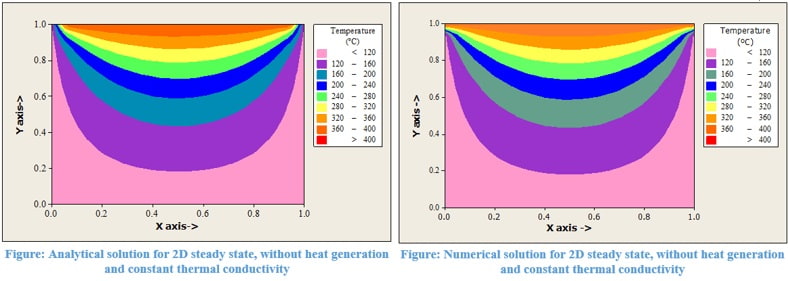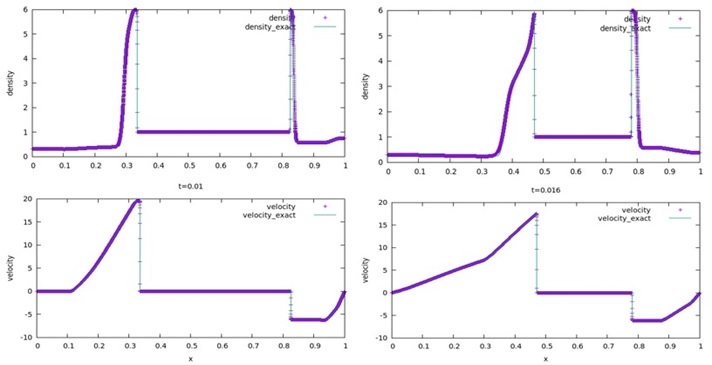The following projects are based on numerical method. This list shows the latest innovative projects which can be built by students to develop hands-on experience in areas related to/ using numerical method.

All the engineering devices we use involves the conversion of energy. In this process, a lot of heat released to the surroundings as a part of energy loss. The efficiency of any device can be increased by minimizing loss due to heat transfer. That’s why a lot of research going on around the world in the field of heat transfer. To solve real-life heat transfer problems Numerical methods are preferred, because of less time consumption, ease, and convenience. To get hands-on experience on numerical methods, here you are going to solve the Two-Dimensional flat plate problem with Constant conductivity heat transfer by using Numerical methods.

Numerical analysis is one of the most researched fields today. Getting an exact solution for physical problems is too difficult and again for most of the physical problems exact solution does not exist at all, so numerical techniques are preferred to obtain a fairly exact solution with ease. In this project, you will write your own codes to simulate temperature distribution over a 1D flat plate and compare its result with the exact solution to check the accuracy of your Numerical solution.

Numerical analysis is one of the most researched fields today. Getting an exact solution for physical problems is too difficult and again for most of the physical problems exact solution does not exist at all, so numerical techniques are preferred to obtain a fairly exact solution with ease. In this project, you will write your own codes to simulate temperature distribution over a 1D flat plate and compare its result with the exact solution to check the accuracy of your Numerical solution.

Solving differential equations are always been challenging for engineers. This is because there is a lot of variants to differential equations and also the complexity of these equations varies with respect to a number of variables involved and order of the equation. A differential equation which describes a physical problem is very complex and cannot be solved by an analytical approach. So, studying numerical methods is important for an engineer. In this project, you will learn the Finite Difference Method (Numerical Method) by solving a Linear Convection equation.

Finite Volume Method is one of the popular numerical methods used by engineers, mathematicians around the world for solving complex differential equations. This is because it has the characteristics to produce accurate and stable solutions. So, studying the finite volume method is important for an engineer. In this project, you will learn how the Finite Volume Method (Numerical Method) is implemented to solve the differential equation by solving a fluid flow problem using Burger equation.
Want to develop practical skills on latest technologies? Checkout our latest projects and start learning for free

Fin is nothing but an extended surface found on the heat exchanging devices such as radiators in Car, Bike engines, Computer CPU heatsinks and Heat exchangers in power plants. An efficient Fin can really increase the performance of a system. There are various types of Fin and analyzing those theoretically takes a lot of effort. So, researchers around the world take help of numerical methods to analyze complex problem such as heat transfer through Fin. In this project, you will work on solving the various type of fin using numerical methods and compare it with a theoretical solution where it exists.

It is expensive to use physical experiments to get essential engineering data for designing is quite expensive. Getting engineering data of a fluid in motion, using Computational Fluid Dynamics (CFD) Simulations are relatively inexpensive. Costs are likely to be decreased as computational power has increased. So, using numerical methods to solve various flow problems is effective. In this project, you are going to solve a one-dimensional problem of interacting blast waves using the Finite Volume Method (FVM).

Turbulent flows have an infinite variety ranging from the flow of blood in our body to the atmospheric flows. Everyday life gives us an intuitive knowledge of turbulence in fluids; during air travel, one often hears the word turbulence generally associated with the fastening of seat-belts. The flow passing an obstacle or an airfoil creates turbulence in the boundary layer and develops a turbulent wake which will generally increase the drag exerted by the flow on the obstacle. The majority of atmospheric or oceanic currents cannot be predicted accurately and fall into the category of turbulent flows, even in the large planetary scales. Galaxies look strikingly like the eddies which are observed in turbulent flows such as the mixing layer, and are, in a way of speaking, the eddies of a turbulent universe. Numerous other examples of turbulent flows arise in aeronautics, hydraulics, nuclear and chemical engineering, oceanography, meteorology, astrophysics, and internal geophysics. A clear understanding of this physical phenomena is one of the most essential and important problems of applied science.

Wind is a random phenomenon because of the many flow situations arising from the interaction of wind with structures. The turbulence of strong winds in the lower levels of the atmosphere arises from interaction with surface features. An outcome of the turbulence is that dynamic loading on a structure depends on the size of eddies. Large eddies, comparable with the structure introduces correlated pressure as they envelope with the structure.

You can build this project at home. You can build the project using online tutorials developed by experts. 1-1 support in case of any doubts. 100% output guaranteed. Get certificate on completing.
Want to develop practical skills on latest technologies? Checkout our latest projects and start learning for free
Join 250,000+ students from 36+ countries & develop practical skills by building projects
Get kits shipped in 24 hours. Build using online tutorials.
Stay up-to-date and build projects on latest technologies